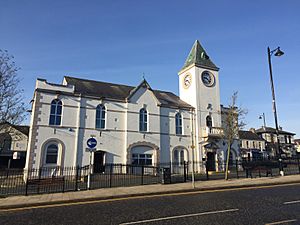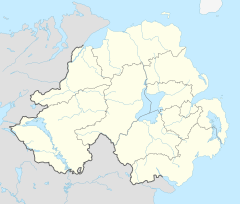Ballyclare facts for kids
Quick facts for kids Ballyclare
|
|
|---|---|
 Ballyclare Town Hall |
|
| Population | 10,850 (2021 census) |
| Irish grid reference | J312903 |
| • Belfast | 13 miles (21 km) |
| District |
|
| County | |
| Country | Northern Ireland |
| Sovereign state | United Kingdom |
| Post town | BALLYCLARE |
| Postcode district | BT39 |
| Dialling code | 028 |
| Police | Northern Ireland |
| Fire | Northern Ireland |
| Ambulance | Northern Ireland |
| EU Parliament | Northern Ireland |
| UK Parliament |
|
| NI Assembly |
|
Ballyclare (which means 'pass of the plain' in Irish) is a small town in County Antrim, Northern Ireland. About 10,850 people lived there in 2021. It is part of the Antrim and Newtownabbey Borough Council area.
The town sits on the Six Mile Water river. Ballyclare likely started because it was a good place to cross the river. An old Norman fort (called a motte) in the War Memorial Park shows how important this crossing was long ago. The wide main street dates back to the 1600s. In the town centre, you'll find the Market Square and the Town Hall.
Ballyclare grew a lot in the 1800s when the railway arrived. It became an important industrial town with a large paper mill and a linen factory. These factories are now closed, but the roads leading to them are still called Mill Road and Green Road. Today, Ballyclare is a local service centre. Many people who live here travel to Belfast for work. It's also a main spot for shopping, education, and fun in the area.
Contents
Discovering Ballyclare's Past
People have lived in the Ballyclare area for about six thousand years! The oldest signs of people here are flint arrow heads. They were found in 1968 when houses were being built north of the river. Thirty-nine flints were discovered, some perfectly made. This shows that people were making and trading tools here over four thousand years ago.
How Ballyclare Got Its Name
When the Normans built Carrickfergus Castle at Carrickfergus, they set up small forts along the river. This river was then called the "Ollar," meaning River of the Rushes. Soldiers traveling from Carrickfergus to Antrim reached this spot after six miles. So, they started calling the Ollar the Six Mile Water. One of these Norman forts is in the War Memorial Park in Ballyclare.
Growth and Important Events
Ballyclare grew after the Plantation of Ulster. In 1756, King George II allowed the town to hold two fairs each year. This made it an important market town.
Around the same time the Pilgrim Fathers went to America, Scottish settlers came to Ballyclare. Famous people like Jonathan Swift preached in Ballyclare. Families of well-known Americans, including Mark Twain, Sam Houston, and General Alexander Macomb, left for America from this town.
People from Ballyclare also took part in the Irish Rebellion of 1798. They fought in the Battle of Antrim. By the early 1900s, Ballyclare was a growing industrial town. It became the biggest paper producer in Ireland. In 1947, a famous car race, the 1947 Ulster Trophy, was held in Ballyclare. This was part of the first full season of FIA's Formula One motor racing.
Ballyclare's Weather
| Climate data for Killylane, Elevation: 250 m (820 ft), 1991–2020 normals | |||||||||||||
|---|---|---|---|---|---|---|---|---|---|---|---|---|---|
| Month | Jan | Feb | Mar | Apr | May | Jun | Jul | Aug | Sep | Oct | Nov | Dec | Year |
| Mean daily maximum °C (°F) | 5.8 (42.4) |
6.2 (43.2) |
8.0 (46.4) |
10.5 (50.9) |
13.5 (56.3) |
15.9 (60.6) |
17.4 (63.3) |
17.1 (62.8) |
15.0 (59.0) |
11.4 (52.5) |
8.2 (46.8) |
6.2 (43.2) |
11.3 (52.3) |
| Daily mean °C (°F) | 3.5 (38.3) |
3.7 (38.7) |
5.1 (41.2) |
7.0 (44.6) |
9.7 (49.5) |
12.3 (54.1) |
13.9 (57.0) |
13.7 (56.7) |
11.9 (53.4) |
8.8 (47.8) |
5.8 (42.4) |
3.9 (39.0) |
8.3 (46.9) |
| Mean daily minimum °C (°F) | 1.3 (34.3) |
1.2 (34.2) |
2.2 (36.0) |
3.6 (38.5) |
5.9 (42.6) |
8.6 (47.5) |
10.4 (50.7) |
10.3 (50.5) |
8.8 (47.8) |
6.2 (43.2) |
3.4 (38.1) |
1.6 (34.9) |
5.3 (41.5) |
| Average precipitation mm (inches) | 122.0 (4.80) |
97.7 (3.85) |
100.9 (3.97) |
87.3 (3.44) |
85.8 (3.38) |
89.2 (3.51) |
103.7 (4.08) |
114.1 (4.49) |
107.0 (4.21) |
138.1 (5.44) |
144.8 (5.70) |
131.8 (5.19) |
1,322.3 (52.06) |
| Average precipitation days (≥ 1.0 mm) | 18.2 | 15.6 | 15.7 | 13.6 | 13.3 | 13.3 | 15.6 | 16.2 | 14.7 | 17.1 | 19.0 | 18.3 | 190.5 |
| Mean monthly sunshine hours | 42.5 | 56.5 | 91.0 | 144.0 | 181.7 | 148.3 | 140.5 | 134.6 | 110.0 | 71.5 | 33.6 | 38.3 | 1,192.3 |
| Source: Met Office | |||||||||||||
People of Ballyclare
In 2011, there were 9,953 people living in Ballyclare. This was a 13.5% increase from 2001.
- About 21.6% of people were under 16 years old.
- About 14.9% were 65 years or older.
- More than half (52.2%) of the people were female.
- Most people (85.7%) were from a Protestant or other Christian background.
- About 5.4% were from a Catholic background.
- Many people (77.4%) felt they had a British national identity.
- About 32.5% felt they had a Northern Irish national identity.
- About 4.5% felt they had an Irish national identity. (People could choose more than one.)
- The average age of people in Ballyclare was 37 years.
- Some people (15%) knew a bit of Ulster-Scots, and a small number (1.9%) knew some Irish (Gaelic).
The town's population has grown a lot! From 1971 to 2011, it increased by almost 400%.
Interesting Buildings in Ballyclare
- Ballyclare Town Hall: This building started as an old Market House around 1855. It was later made bigger, and a clock tower was added. The clock only has three faces, missing one on the west side.
- The Old Presbyterian Church: Established in 1642 on Main Street, this is one of the oldest buildings in town. Its former Manse (a house for the minister) on Mill Road is also very old. It was even used as a school in the 1800s!
- Ballyclare Primary School: The main building was built in 1880. It has been expanded many times since then, with additions in the 1920s, 1950s, and 2006.
- There are two large secondary schools: Ballyclare High School (a grammar school) and Ballyclare Secondary School.
Ballyclare's Culture
Stories and Books
Archibald McIlroy, who was born in Ballyclare around 1860, wrote a novel called When Lint Was in the Bell. It's a fun story that describes life in Ballyclare in the 1800s. Sadly, Mr. McIlroy was lost when the RMS Lusitania sank in 1915.
Music in the Town
Ballyclare has a rich musical tradition with several groups:
- Ballyclare Male Choir: This choir has been performing since 1933.
- Ballyclare Victoria Flute Band: This band has been playing music since 1919.
- Major Sinclair Memorial Pipe Band: This band often performs in parades and competitions.
- The Clare Chorale: This mixed-voice choir started in 2003 with former students from Ballyclare High School. It now has over 50 members and performs many types of music.
The May Fair
The Ballyclare May Fair happens every year on a Tuesday in May. It's part of a week of fun events! This tradition started when King George II allowed the town to hold two fairs each year. Now, only the May Fair continues.
The event began as a horse fair. It became so famous that people from cavalry (horseback soldier) regiments all over Europe came to buy horses here. The fair was most popular before World War I. Even though it's changed, it's still a much-loved event in Ballyclare.
Famous People from Ballyclare
- Andy Cairns: Guitarist and singer for the band Therapy?.
- Gareth Maybin: A professional golfer who plays on the European Tour.
- Willie John McBride: A legendary former captain of the Ireland and British & Irish Lions rugby teams. He lives in Ballyclare.
- Paddy McNair: A professional footballer for Middlesbrough FC and the Northern Ireland national football team. He went to Ballyclare Secondary School.
- Jonathan Rea: A six-time world superbike champion.
- Tommy Wright: A former goalkeeper for the Northern Ireland national football team and a football manager.
Getting Around Ballyclare
Roads
The main roads in Ballyclare are Main Street, North End, and Market Square in the town centre. Other roads like Hillhead Road, Doagh Road, Rashee Road, Ballyeaston Road, and Ballycorr Road lead into the town. You can find both free and paid parking in the town centre.
Railways (Past)
Ballyclare used to have two railway lines, but they both closed in the 1950s.
- One was a narrow gauge line to Larne, which opened in 1878 and closed for passengers in 1930.
- The other was a wider gauge line to Belfast, which opened in 1884 and closed for passengers in 1938.
Both lines fully closed in 1950. The old Ballyclare railway station building was taken down in 2004. However, the old engine shed is still there and can be seen from Hillhead Road.
Schools in Ballyclare
- Ballyclare Nursery School
- Ballyclare Primary School
- Fairview Primary School
- Ballyclare High School
- Ballyclare Secondary School
Sports in Ballyclare
- Ballyclare Comrades F.C.: This football club plays at Dixon Park in the NIFL Championship.
- Ballyclare Rugby Football Club: Formed in 1949, this club is based at "The Cloughan." It offers rugby for all ages, including senior teams, youth teams, mini rugby, ladies rugby, and a special needs team called Clare Hares.
- Templepatrick Cricket Club: This cricket club also plays at The Cloughan.
See also
 In Spanish: Ballyclare para niños
In Spanish: Ballyclare para niños
 | Misty Copeland |
 | Raven Wilkinson |
 | Debra Austin |
 | Aesha Ash |


